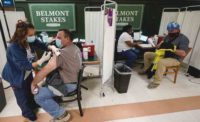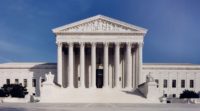The U.S. Court of Appeals in New Orleans on Nov. 6 stayed the Biden administration's requirement that workers at U.S. companies with at least 100 employees be vaccinated against COVID-19 or be tested weekly, citing potential "grave statutory and constitutional" issues raised by opponents of the US Occupational Safety and Health Administration's emergency temporary standard announced on Nov. 4.
In a Nov. 8 administration response, the US Justice Dept. said OSHA's authority, under law, to issue the standard "is unambiguous and limited to addressing grave dangers to employees in the workplace." The response said blocking it from taking effect “would likely cost dozens or even hundreds of lives per day, in addition to large numbers of hospitalizations, other serious health effects, and tremendous costs.”
The New Orleans court has to decide whether to lift the temporary restraining order or issue a permanent court injunction. A federal district court judge in Washington, D.C. on Nov. 8 separately declined to block the rule. Legal observers speculate that the lawsuit by five states and a number of private entities, which generated the stay would be heard by the U.S. Supreme Court.
A total of 26 states have joined in lawsuits in the New Orleans court and in three other appellate courts against the standard and an earlier order affecting federal contractors. White House chief of staff Ron Klain said in a Nov. 7 TV interview that he was “quite confident that when this gets fully adjudicated” in court, the standard would hold up legally.
OSHA Unveils Emergency Standard
The New Orleans court action by a three judge panel follows the Nov. 5 publication of the U.S. Labor Dept. agency's standard in the Federal Register that requires employers with 100 or more employees to either mandate COVID-19 vaccinations for their employees or require weekly testing for the virus.
It was to remain temporary for a six-month period to accelerate COVID-19 vaccinations among employees of larger firms as a follow-on to a similar order taking effect for federal contractor workers.
The OSHA standard, if upheld by the courts, would give both employee groups until Jan. 4 to begin requiring vaccination or weekly testing of employees. Federal contractor employees originally had to be fully vaccinated by Dec. 8 under earlier Biden administration guidance that took effect on Oct. 15.
The standard also allows the weekly virus testing option after Jan. 4 for large employers, but it does not extend that option to federal contractors.
The first deadline for large employers would have been Dec. 5, when OSHA says they “must develop, implement and enforce" a mandatory vaccination policy, or one requiring employees to choose to be vaccinated or undergo regular COVID-19 testing and to wear a face covering at work.
The standard has a 30-day comment period, as OSHA weighs content changes and determines whether it needs to extend the temporary standard of issue a permanent final one. The federal Office of Management and Budget completed a regulatory review of the emergency standard on Nov. 1.
“While vaccination remains the most effective and efficient defense against COVID-19, this emergency temporary standard will protect all workers, including those who remain unvaccinated, by requiring regular testing and the use of face coverings by unvaccinated workers to prevent the spread of the virus,” said Deputy Assistant Labor Secretary for Occupational Safety and Health Jim Frederick. “As part of OSHA’s mission to protect the safety and health of workers, this rule will provide a roadmap to help businesses keep their workers safe.”
The standard offers medical and religious exemptions and estimates that about 5% of employees will seek and receive those accommodations.
U.S. Labor Dept. Solicitor General Seema Nanda, in a briefing.added that the standard preempts any state or local law that conflicts. “OSHA has a long history of how to enforce standards, and this one is no different,” added Frederick, also at the briefing.
States Rush to Court
Texas, Louisiana, Mississippi, South Carolina, and Utah, along with businesses, religious groups and individuals filed a combined suit in the New Orleans appellate court.
Florida, Alabama, and Georgia also sued in the Atlanta appeals court, with the Associated Builders and Contractors announcing Nov. 9 that it had joined that lawsuit. "ABC continues to encourage vaccination against COVID-19 but cannot support this mandate," said Jay Reed, president of its Alabama chapter.
Kentucky, Idaho, Kansas, Ohio, Oklahoma, Tennessee and West Virginia filing suit in the Cincinnati appeals court and Missouri, Arizona, Nebraska, Montana, Arkansas, Iowa, North Dakota, South Dakota, Alaska, New Hampshire, Wyoming and private entities filing suit in the St. Louis appeals court, said law firm Polsinellii PC in a Nov. 5 National Law Review update.
"Federal courts have previously held that OSHA rules are ripe for challenge when the rule is published in the Federal Register," said.Polsinelii.
Kentucky, Ohio and Tennessee also filed a challenge to the federal contractor vaccination mandate in the Cincinnati appeals court.
"It will take weeks of planning for employers to comply" with the OSHA standard deadlines, said law firm Ogletree Deakins. "Accordingly, employers may want to continue preparing for [it] as if it is going to take effect while litigation continues."
Some major employers say that vaccination mandates have boosted employee inoculation rates, with United Airlines reporting 99% of its staff is vaccinated, with Tyson Foods at 96%, up from 50% when its mandate was announced, the company said but data from the Associated General Contractors of America still puts construction vaccination rates around 50%.
Looking at the Details
The standard does not mandate employers to provide or pay for vaccinations, testing or face covering but does require paid time off to workers to get shots and paid leave to recover from any side effects. Part-time workers count toward the covered employee total but independent contractors do not, says OSHA. Frederick said individual insurer and insurance policies may also dictate vaccination compensation rules.
Covered employers will be required to determine each employee’s vaccination status and maintain records and must mandate that employees who test positive for COVID-19 notify the employer promptly and be removed from the workplace, regardless of vaccination status. Not fully vaccinated employees must be tested at least weekly and mandated to wear masks when indoors or in a vehicle with another person for work purposes.
The standard woould cover two-thirds of the nation’s private-sector workforce, said OSHA.
In the 26 states and two territories with OSHA State Plans, the standard will also cover public-sector workers employed by state and local governments, including educators and school staff.
According to the standard, “on a typical multi-employer worksite such as a construction site, each company represented—the host employer, general contractor and each subcontractor—would only need to count its own employees. The host employer and general contractor would not need to count the total number of workers at each site.”
But a covered employer “must count the total number of workers it employs regardless of where they report for work on a particular day,” says the standard.
OSHA says the standard generally does not apply to employees “when they are working alone, or when they are working from home,” but there could be exceptions. While the mandate also exempts employees who work “exclusively outdoors,” it would apply to those who may have partial indoor work in a construction trailer, a shared site vehicle or “inside a partially complete structure.”
OSHA says it’s not feasible now for the standard to apply to firms of less than 100 employees, but DOL’s Nanda said the agency could “consider extending [it] to smaller firms” during the rulemaking process to create a final standard.
Frederick said OSHA staff “may do spot checks to insure compliance,” with citations and financial penalties possible.
Stakeholder Reactions Vary
While the U.S. Chamber of Commerce noted ”significant adjustments" in the rule to be published based on business community concerns, more lawsuits are expected as groups analyze specifics in the 490-page document.
“The rule creates more confusion than clarity,” says Associated General Contractors CEO Stephen Sandherr. “The measure claims to require workers to incur the costs of testing, yet it also says many employers will likely be required to pay those workers for the time spent getting tested.” He also takes issue with OSHA’s definition of outdoor work and remains concerned about “vaccine-reluctant” workers leaving larger firms or the industry.
"This association will provide comments to this measure ... and continue to explore all other possible options to protect the construction industry and the economy from the many risks created by this measure," said Sandherr.
OSHA officials declined to comment on a briefing session question related to added worker departures.
The Associated Builders and Contractors “will be participating in the rulemaking process and plans to assess additional actions, which may include facilitating industry compliance and/or filing a legal challenge,” said Ben Brubeck, vice president of regulatory, labor and state affairs. “In the interim, ABC continues to encourage industry stakeholders to get the COVID-19 vaccine and use all available tools to ensure healthy and safe work environments.”
House Education and Labor Committee Chairman Robert C. “Bobby” Scott (D) said that vaccine requirements have been used in all 50 states "to eradicate highly contagious diseases, from polio to smallpox, for decades," adding that workplace COVID vaccination policies have shown success and "are critical to ending the pandemic."
But committee Republicans, led by Fred Keller of Pennsylvania, said they plan to introduce "immediately" a resolution under the Congressional Review Act to nullify the OSHA action when it is received by Congress.
Contractors interviewed were not confident the standard will provide any clarity as to their vaccination responsibilities in 2022 and beyond. They added that mandates from clients for jobsite admittance still will vary.
Chris Carson, president of Springfield, Mo.-based Carson-Mitchell Inc., a contractor with about 100 full-time employees, says the firm works “for a pharmaceutical plant that has mandated vaccinations. As a vendor/contractor, we have to sign what amounts to a commitment to only provide vaccinated employees or be replaced by another company." He says the firm employs “enough vaccinated employees to cover the work, but that means shifting people around."
Carson says the standard "may help out," although the firm's pharma client has "made the decision to push ahead with mandates regardless. We are mid-project and have to comply or lose our oldest customer of nearly 60 years."
Chicago-based Clayco Inc., which ranks at No. 24 on ENR's Top 400 Contractors list, has provided feedback to the White House Safer Workforce Taskforce and the Centers for Disease Control and Prevention since the pandemic began and still plans to move forward with its employer mandate after the OSHA standard is published.
"We will be following and implementing the OSHA directive as it is ultimately prescribed," the company said in a statement. "Our leadership is working through the logistics of implementation to ensure we are compliant across our offices and sites."
The National Association of Building Trades Unions did not respond to a request for comment on the standard.







Post a comment to this article
Report Abusive Comment